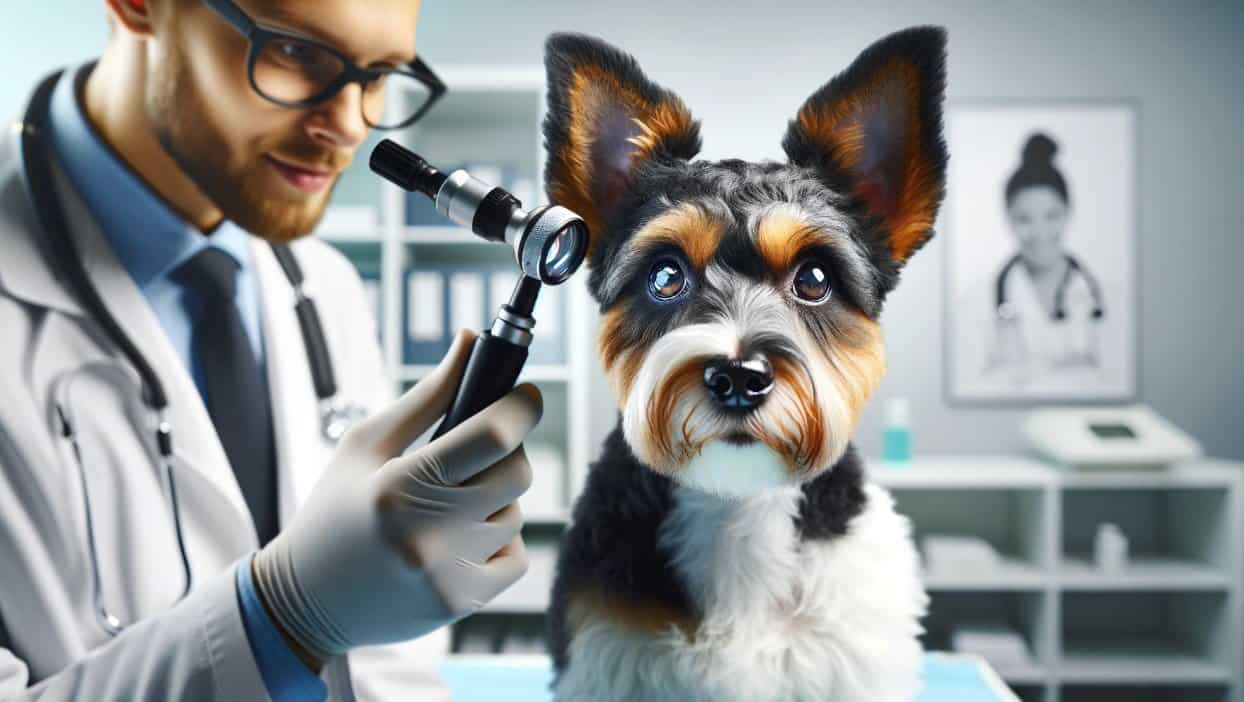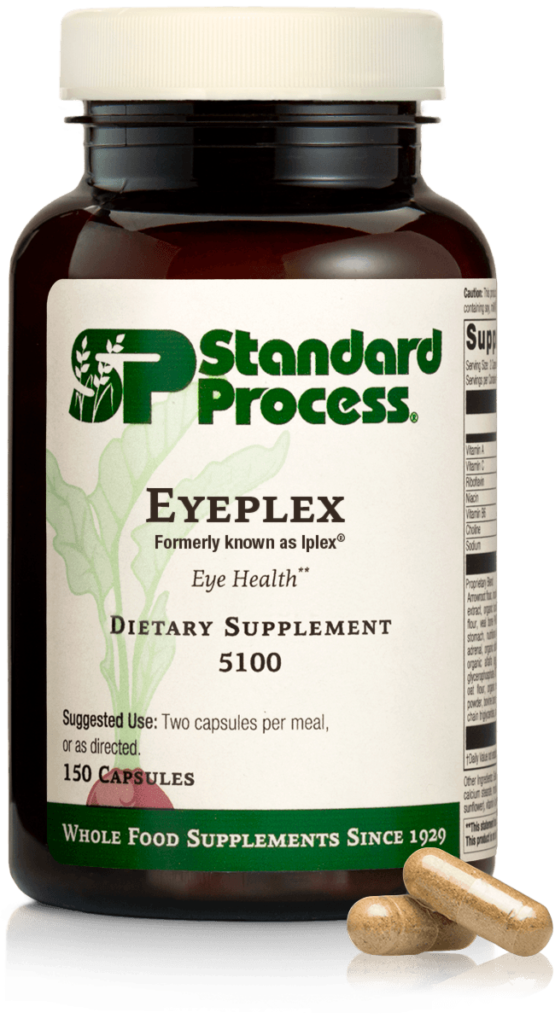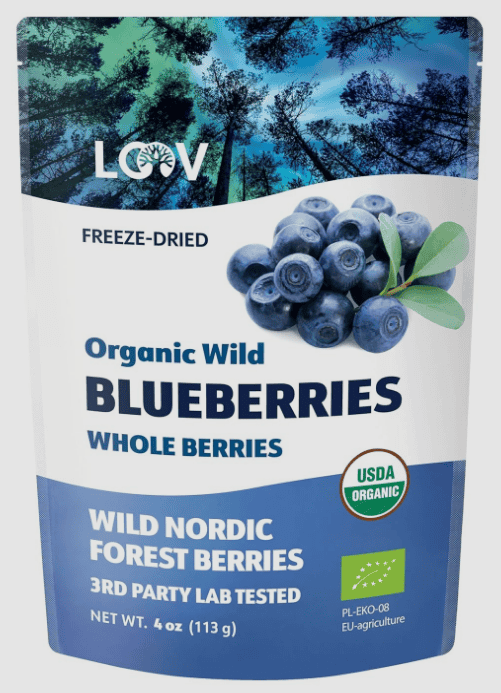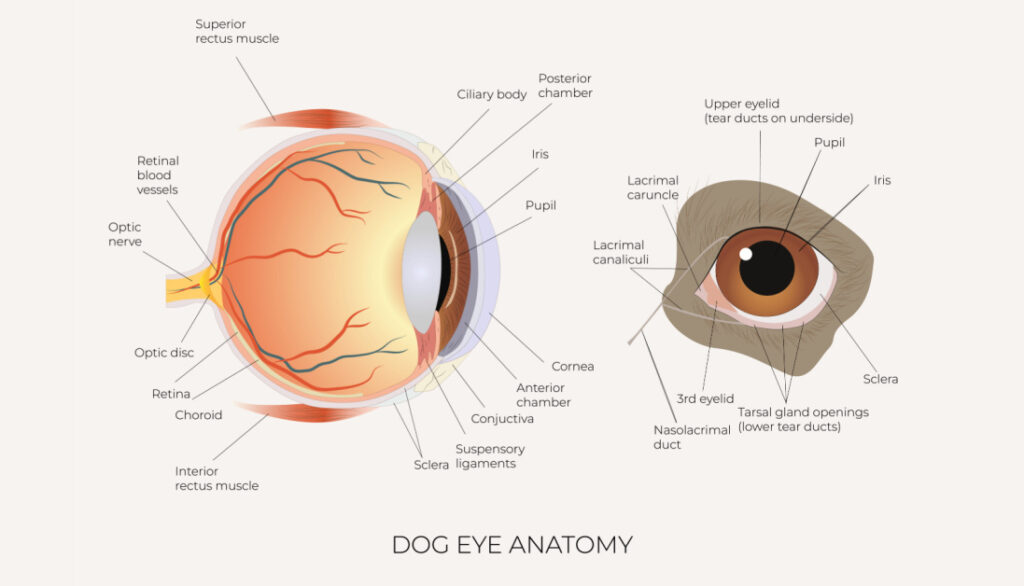Hey there, fellow dog parent! As a holistic veterinarian, I’ve seen just about every breed of dog that you can imagine. Today, I’d like to talk about a breed that’s close to my heart – the Brazilian Terrier. These energetic and charismatic dogs are a joy to have around, but like any breed, they come with their own unique health considerations. Specifically, I’d like to talk about Brazilian Terrier Eye Health.
Eye health is crucial for our furry friends, and Brazilian Terriers are no exception. They have a unique eye structure that can be prone to specific issues. But don’t worry, with the right care and attention, your Brazilian Terrier can enjoy excellent eye health throughout their life.
Understanding the common eye conditions in Brazilian Terriers, how to prevent them, and how to maintain good eye health is important for every Brazilian Terrier parent. Whether you’re considering adopting a Brazilian Terrier, or you’re already a proud parent, this information will be invaluable to you. So, let’s get started on our journey to understanding and improving the eye health of our beloved Brazilian Terriers.

Understanding Breed Specific Eye Structure
As a holistic veterinarian, I’ve seen firsthand how understanding the unique eye structure of your Brazilian Terrier can make a world of difference in preserving their eye health. The Brazilian Terrier, also known as the Terrier Brasileiro, has distinctive eyes that are full of life, reflecting their energetic and playful nature. However, these eyes are not just windows to their soul, but also a key indicator of their overall health.
Brazilian Terriers have round, medium-sized eyes that are dark in color. The eyes are set well apart, giving them a wide field of vision. This breed-specific eye structure is crucial to understand, as it can predispose them to certain eye conditions and requires specific care strategies.
For example, their prominent eyes are more exposed to environmental elements, making them more susceptible to injuries and infections. Also, their eyelashes, which are typically dense and long, can sometimes cause irritation if they poke the eyeball. This is why regular grooming is essential for this breed.
Additionally, the breed’s eye structure can sometimes lead to the development of conditions like entropion, where the eyelid rolls inward, causing the eyelashes to rub against the cornea. This can cause discomfort and damage to the cornea if not addressed promptly.
Furthermore, the tear ducts of Brazilian Terriers are narrower compared to other breeds. This can lead to issues with tear drainage, resulting in tear stains or even infections if not properly managed.
Understanding these breed-specific quirks can help you be more proactive in monitoring your Brazilian Terrier’s eye health. It’s essential to keep an eye out for any changes in their eyes’ appearance or behavior, such as excessive tearing, redness, or squinting. These could be early signs of eye issues that need prompt veterinary attention.
By understanding the unique eye structure of your Brazilian Terrier, you’re not just appreciating their beauty, but also empowering yourself with the knowledge to provide them with the best care possible. Remember, their eyes are not just a reflection of their vibrant personality, but a mirror to their health.
Common Eye Issues In Brazilian Terrier
As a veterinarian, I often see cases of eye health issues in Brazilian Terriers. These dogs, known for their energy and loving nature, are unfortunately predisposed to certain eye conditions. Below, I’ll cover the common eye problems that affect this breed and the potential solutions for them.
The first step in maintaining your Brazilian Terrier’s eye health is understanding the common issues they might face. So, let’s dive into them:
- Conjunctivitis: This is an inflammation of the conjunctiva, the membrane that covers the inside of the eyelids and the white part of the eye. It can cause redness, swelling, and discharge. It’s often caused by allergies, irritants, or infections.
- Entropion: This is a condition where the eyelid rolls inward, causing the eyelashes to rub against the eye and cause irritation. It can lead to corneal ulcers and vision loss if not treated.
- Corneal Ulcers: These are painful sores on the cornea, the clear front surface of the eye. They’re often caused by trauma, entropion, or dry eye.
Now that we’ve covered the common issues, let’s talk about the solutions. The key to treating and preventing these conditions lies in regular check-ups and consistent eye care.
For conjunctivitis, the treatment will depend on the cause. If it’s due to an infection, your vet might prescribe antibiotics. If it’s due to allergies, antihistamines or steroids might be recommended. Always make sure to keep your Brazilian Terrier’s environment clean and free of potential allergens or irritants.
In the case of entropion, surgery is often required to correct the eyelid’s position. This can help prevent future corneal ulcers and preserve your dog’s vision.
For corneal ulcers, treatment usually involves antibiotic eye drops to fight off any infection and pain medication to help your dog feel more comfortable. In severe cases, surgery may be needed.
Remember, the key to maintaining your Brazilian Terrier’s eye health is regular check-ups and early detection. If you notice any changes in your dog’s eyes, such as redness, swelling, or discharge, don’t hesitate to contact your vet. Early treatment can often prevent serious damage and help keep your furry friend’s eyes healthy.

Prevention of Eye Problems: Essential Nutrients for Eye Health
Ensuring your Brazilian Terrier gets the right nutrients for optimal eye health is essential for maintaining clear vision and preventing age-related issues. Natural, nutrient-rich foods and supplements can play a key role in supporting their eyesight. From vitamin A-packed freeze-dried liver treats to antioxidant-rich blueberries and targeted supplements like Eyeplex by Standard Process, there are several ways to nourish your dog’s eyes. In this section, we’ll explore how these powerful ingredients contribute to long-term vision health and overall well-being.
Eyeplex by Standard Process
Eyeplex by Standard Process is a specialized supplement designed to support your Brazilian Terrier’s eye health with a blend of essential nutrients. Formulated with key vitamins, minerals, and antioxidants, Eyeplex helps protect against oxidative stress, supports retinal function, and promotes overall vision health. Ingredients like vitamin A, vitamin C, and zinc contribute to maintaining strong eyesight, while whole food ingredients provide additional phytonutrients for cellular protection. Adding Eyeplex to your Brazilian Terrier’s diet can be especially beneficial for aging dogs or breeds prone to eye conditions, offering targeted nutritional support to keep their vision sharp and healthy for years to come.

Freeze-Dried Blueberries
Freeze-dried blueberries are a powerhouse of antioxidants that can help protect your Brazilian Terrier’s eyes from oxidative stress and age-related damage. Rich in vitamins C and E, as well as anthocyanins, these tiny but mighty berries help combat free radicals that can contribute to eye diseases like cataracts and macular degeneration. Incorporating freeze-dried blueberries into your dog’s diet provides a natural and delicious way to support retinal health, reduce inflammation, and promote overall vision longevity. Plus, they’re a low-calorie, dog-friendly treat that makes a great addition to a balanced diet for long-term eye health.

Freeze-Dried Liver
Freeze-dried liver treats are an excellent natural source of vitamin A, an essential nutrient for your Brazilian Terrier’s eye health. Vitamin A plays a crucial role in maintaining good vision, especially in low-light conditions, while also supporting overall immune function and skin health. Since liver is rich in bioavailable vitamin A, incorporating freeze-dried liver treats into your dog’s diet provides a convenient and nutritious way to promote optimal eye function. Just be sure to feed them in moderation, as excessive vitamin A can lead to toxicity. Adding these nutrient-packed treats to your pup’s routine is a simple, tasty way to support their long-term vision and well-being!

Remember, good eye health is not just about what your Brazilian Terrier consumes but also about their overall lifestyle. Regular exercise, sufficient sleep, and regular vet check-ups are also vital for maintaining their eye health.
Environmental Hygiene To Reduce Eye Problems
One of the most effective ways to maintain your Brazilian Terrier’s eye health is by ensuring a clean and safe environment. Environmental hygiene plays a crucial role in preventing eye infections and irritations. Here are some key factors to consider:
Indoor Air Quality
Indoor air quality can significantly impact your Brazilian Terrier’s eye health. Dust, dander, and other airborne particles can cause eye irritation, leading to scratching, redness, and possible infections. Regularly clean your home, particularly areas where your pet spends most of its time. Use air purifiers to filter out allergens and maintain good ventilation.
It’s also essential to keep your Brazilian Terrier’s bedding clean. Wash it regularly to remove any potential irritants that could harm your pet’s eyes.
Sprays, Diffusers, Candles, Incense
Many pet owners love using sprays, diffusers, candles, and incense to keep their homes smelling fresh. However, these products can sometimes contain chemicals that irritate your Brazilian Terrier’s eyes. If you notice your dog squinting, tearing, or rubbing its eyes excessively after you’ve used these products, it might be time to consider alternatives.
- Choose pet-friendly products: Look for sprays and diffusers specifically designed to be safe for pets. These products are usually free from harmful chemicals and are less likely to cause eye irritation.
- Use natural alternatives: Instead of commercial air fresheners, consider natural alternatives like essential oils. However, remember to use them sparingly as some can be potent and cause irritation.
- Keep them out of reach: Ensure candles and incense are placed in areas where your Brazilian Terrier can’t accidentally come into contact with them.
Remember, your Brazilian Terrier’s eye health is vital for its overall well-being. A clean and safe environment goes a long way in preventing eye issues and ensuring your pet’s happiness and comfort. Stay vigilant about potential irritants in your home and take immediate action if you notice any signs of eye discomfort in your pet.

Routine Brazilian Terrier Eye Care & Maintenance
When it comes to maintaining the Brazilian Terrier’s eye health, daily and weekly care routines are essential. Just like us, our furry friends can benefit from regular eye care routines. These routines not only help to keep their eyes clean and healthy but can also help detect any potential eye problems early.
Daily & Weekly Care & Maintenance
Every day, take a few moments to observe your Brazilian Terrier’s eyes. Look for signs of redness, cloudiness, or discharge, which could indicate an underlying issue. You can use a soft, damp cloth to gently clean around your pet’s eyes, removing any dirt or discharge. Always remember to wipe from the inner corner of the eye outwards to avoid introducing any dirt into the eye.
Weekly, try to do a more thorough inspection. Look closely at your pet’s eyes in a well-lit area. The whites of their eyes should be clear, and the area around the pupils should be bright and vibrant. If you notice any changes in color, shape, or size of the pupils, it’s time to consult your vet.
Monitor Hair Length, Nail Length, Bath Frequency
Another important aspect of Brazilian Terrier eye care is monitoring their hair and nail length. Long hair can irritate the eyes and lead to infections, while long nails can scratch the eyes, causing serious damage. Regular grooming can help keep your pet’s eyes safe. Trim the hair around their eyes regularly and ensure their nails are always at an appropriate length.
Additionally, bath frequency can also impact your Brazilian Terrier’s eye health. Too many baths can dry out their skin and eyes, while too few can lead to a build-up of dirt and bacteria. Aim to give your Brazilian Terrier a bath every 4-6 weeks, and always be careful to avoid getting soap or water in their eyes.
Remember, regular vet check-ups are crucial for early detection and treatment of any potential eye problems. Always consult your vet if you notice any changes in your pet’s eyes or if they seem to be experiencing any discomfort. With proper care and maintenance, you can help ensure your Brazilian Terrier’s eyes stay healthy and bright!
Frequently Asked Questions
1. What are common eye health conditions in Brazilian Terriers?
Brazilian Terriers can be prone to various eye health conditions such as cataracts, glaucoma, progressive retinal atrophy (PRA), and cherry eye.
2. How can I identify if my Brazilian Terrier has an eye problem?
Watch out for symptoms like redness, excessive tearing, cloudiness, squinting, rubbing or pawing at the eyes, and changes in vision. If you notice any of these signs, it’s important to consult a veterinarian.
3. Can eye problems in Brazilian Terriers be treated?
Yes, many eye conditions in Brazilian Terriers can be treated or managed with proper veterinary care. Treatment options may include medications, surgery, or other interventions depending on the specific condition.
4. How can I prevent eye problems in my Brazilian Terrier?
Regular veterinary check-ups are essential to monitor your dog’s eye health. Additionally, keeping their eyes clean, avoiding exposure to irritants, and providing a balanced diet with necessary nutrients can help maintain good eye health.
5. Should I seek immediate veterinary attention if my Brazilian Terrier has an eye injury?
Yes, any eye injury should be considered an emergency. It’s crucial to seek immediate veterinary attention to prevent further damage and ensure proper treatment.
